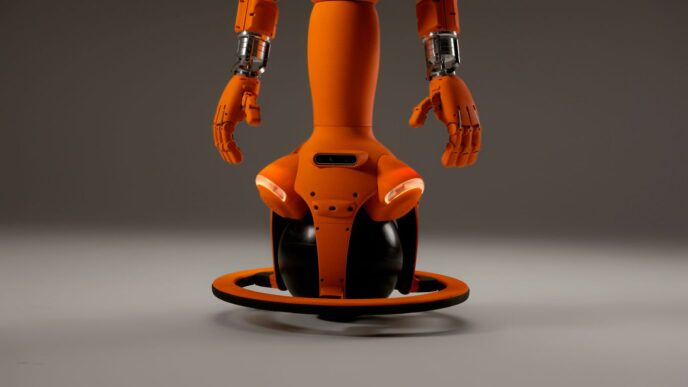Understanding The Robotics Engineer Salary Landscape

So, you’re curious about what a robotics engineer actually makes, huh? It’s a pretty hot field right now, and for good reason. These are the folks designing, building, and keeping all those cool robots and automated systems running. Think about it – robots are showing up everywhere, from making cars on assembly lines to helping surgeons in hospitals, and even exploring places humans can’t easily go. It’s a job that really blends a love for tech with making things work in the real world.
Defining The Role Of A Robotics Engineer
A robotics engineer is basically the architect and builder of our automated future. They’re the ones who figure out how a robot should work, write the code that tells it what to do, and make sure all the mechanical and electronic bits play nicely together. This isn’t just about making a robot move; it’s about creating systems that can perform tasks, sometimes on their own, sometimes alongside us. They’re involved in everything from the initial idea and design to the nitty-gritty of programming and testing. It’s a hands-on role that requires a mix of creative thinking and solid engineering know-how.
Key Skills For Robotics Engineering Success
To really shine as a robotics engineer, you’ll need a solid set of skills. It’s not just one thing; it’s a combination that makes you effective.
- Programming Prowess: You’ve got to be comfortable with languages like Python and C++. These are the tools you’ll use to bring your robots to life.
- Math and Physics Chops: Understanding calculus, linear algebra, and physics is super important. It helps you figure out how robots move, how forces affect them, and how to control them precisely.
- Problem-Solving Mindset: Robots don’t always work perfectly the first time. You need to be good at figuring out what went wrong and how to fix it.
- Mechanical and Electrical Know-How: Since robots are a mix of hardware and software, knowing how the physical parts work and how electronics tie in is a big plus.
The Growing Demand For Robotics Expertise
It’s no secret that the world is getting more automated. This means the need for people who know how to build and manage these systems is shooting up. Companies across all sorts of industries are looking for robotics engineers to help them improve efficiency, create new products, and tackle tasks that are too difficult or dangerous for people. This increasing demand is a major reason why robotics engineering is such an attractive career path right now, with good earning potential. The market for robotics is expanding rapidly, and that translates directly into more job opportunities for skilled engineers.
Factors Influencing Robotics Engineer Compensation
So, you’re curious about what makes a robotics engineer’s paycheck go up or down? It’s not just about how many robots you can build. Several things really shape how much you can expect to earn.
Educational Background and Specialization
Your schooling definitely plays a big part. Most robotics engineers start with a bachelor’s degree in fields like computer science, mechanical engineering, or electrical engineering. But if you want to really stand out and potentially earn more, getting a master’s or even a Ph.D. in robotics or a related area can open doors to more specialized roles, especially in research and development. Think about it – more advanced knowledge often means more complex problems you can solve, and companies are willing to pay for that.
Geographic Location and Cost of Living
Where you decide to work matters a lot. Big tech hubs or areas with a high cost of living, like Silicon Valley or parts of Boston, tend to offer higher salaries. This makes sense because living there is more expensive, and companies often have to pay more to attract talent. On the flip side, if you’re in a smaller town or a region with a lower cost of living, the salary might be lower, even if the job itself is similar. It’s a trade-off, for sure.
Industry and Company Size Impact
What kind of company are you working for, and what industry are they in? That makes a difference too. For instance, engineers working in cutting-edge fields like autonomous vehicles or advanced AI research might see higher pay than those in more traditional manufacturing settings. Similarly, large, established tech companies often have bigger budgets and can offer more competitive salaries and benefits compared to smaller startups, though startups might offer other perks like stock options. It really depends on the company’s financial health and its specific needs in the robotics space.
Projected Robotics Engineer Salary Trends For 2025
Anticipated Salary Growth Rates
Looking ahead to 2025, the financial outlook for robotics engineers appears quite positive. Experts are predicting a steady climb in salaries, likely outpacing many other tech fields. This isn’t just a small bump; we’re talking about a sustained upward trend. This growth is directly tied to how much companies are investing in automation and AI across all sorts of industries. Think about it: more robots mean more need for the people who design, build, and fix them.
Here’s a general idea of what that growth might look like:
- Annual Growth: Expect an average annual salary increase somewhere in the ballpark of 8-12%. It’s not a guarantee, of course, but it’s a strong forecast.
- Market Expansion: The global robotics market itself is expanding rapidly. From a few hundred billion dollars now, it’s projected to reach well over $250 billion by 2028. That kind of growth usually means more jobs and better pay for the engineers making it happen.
Emergence Of Specialized Robotics Roles
As the field gets more complex, we’re seeing new, specialized jobs pop up. It’s not just a general "robotics engineer" anymore. Companies are looking for people with very specific skills. This specialization often means higher pay because these skills are harder to find.
Some of these emerging roles include:
- AI Ethics Engineers: As robots become more advanced, ensuring they operate ethically and responsibly is becoming a big deal. These engineers focus on the moral implications of AI and robotics.
- Explainable AI (XAI) Engineers: These folks work on making AI systems understandable. When a robot makes a decision, an XAI engineer helps figure out why it made that decision.
- Robotics Operations Engineers: These are the people who keep the complex robotic systems running smoothly in factories or other environments once they’re installed.
Impact Of Market Growth On Earnings
The overall expansion of the robotics market is a huge factor in how much engineers can earn. When more industries, from healthcare to agriculture to manufacturing, adopt robotic solutions, the demand for skilled professionals naturally goes up. This increased demand, coupled with the specialized skills required for newer roles, puts engineers in a stronger position to negotiate better salaries. It’s a cycle: market growth fuels innovation, innovation creates specialized roles, and specialized roles command higher compensation. So, if you’re thinking about a career in robotics, 2025 looks like a pretty good year to be getting in.
Navigating Your Robotics Engineering Career Path
So, you’re thinking about a career in robotics, huh? It’s a pretty cool field, honestly. But like any job, there are certain things you’ll need to get good at to really make it work and, you know, get paid well. It’s not just about liking robots; it’s about having the right mix of smarts and skills.
Essential Programming and Software Skills
Look, if you want to build robots that actually do stuff, you’ve got to speak their language. That means getting comfortable with coding. Python and C++ are the big ones here. You’ll use them to tell the robot what to do, how to move, and how to react to things. Beyond just writing code, you need to know how to build software that doesn’t fall apart. Think about things like using Git for version control – it’s like a save button for your code, but way more organized. Good software practices mean your robot won’t just crash when you least expect it. It’s about making reliable systems, not just quick fixes.
The Importance Of Mathematical And Analytical Abilities
Robotics is heavy on math. You can’t just guess how a robot arm will move or how much force it needs. You’ll be dealing with calculus, linear algebra, and physics pretty regularly. These aren’t just abstract concepts; they help you figure out motion, forces, and how to control everything. Being able to break down a big problem into smaller, manageable pieces is also key. Can you look at why a robot isn’t working right and figure out the root cause? That’s where your analytical skills come in. It’s about being able to look at data, understand what it means, and then make smart decisions based on it.
Cultivating An Inquisitive Mindset
Honestly, the best robotics engineers are the ones who are just plain curious. They don’t just accept that something works; they want to know why it works and how it could work better. This means always asking questions, tinkering, and not being afraid to try new things, even if they might not work out at first. It’s this drive to explore and understand the inner workings of things that pushes the field forward. You’ll be constantly learning, adapting, and figuring out new ways to make robots do amazing things. A curious mind is your best tool in this ever-changing industry.
Global Robotics Engineer Salary Benchmarks
United States Robotics Engineer Earnings
In the U.S., robotics engineers are seeing some pretty solid paychecks. Depending on where you are and what you’re doing, you can expect to earn somewhere in the ballpark of $82,000 to $94,000 annually. Of course, landing a gig in a tech hub like Silicon Valley or Seattle might bump that number up even higher, especially if you’re working for one of the big players in automation or AI.
United Kingdom Robotics Engineer Compensation
Over in the UK, the demand for robotics talent is also on the rise, and so are the salaries. Robotics engineers there are generally looking at an annual income between £59,000 and £66,000. Like in the States, your specific location within the UK and the type of company you join will play a big role in your final compensation package.
International Salary Variations
It’s not just the US and UK, though. Robotics is a global game. In places like Western Europe, think Germany or France, salaries can range from about $80,000 to $120,000 USD, adjusted for local currency. Canada, particularly in cities like Toronto, also offers competitive pay, often in the CAD $90,000 to $140,000 range. These figures can shift quite a bit based on the local economy, the number of tech companies in the area, and the specific needs of the employer. The global market for robotics is expanding, and with it, the earning potential for skilled engineers worldwide.
Here’s a quick look at some general ranges:
- United States: $82,000 – $94,000 USD
- United Kingdom: £59,000 – £66,000 GBP
- Western Europe (e.g., Germany, France): $80,000 – $120,000 USD (or local equivalent)
- Canada (e.g., Toronto): CAD $90,000 – $140,000
Maximizing Your Robotics Engineer Earning Potential
So, you’re in the robotics game and thinking about how to boost your paycheck? It’s not just about landing that first job; it’s about smart moves that pay off over time. Think of it like upgrading your robot’s components – you want the best performance, and that applies to your career too.
Leveraging Remote Work Opportunities
Remote work isn’t just a perk anymore; it’s a serious salary booster. Companies are increasingly open to hiring talent from anywhere, which means you’re not limited to jobs in high-cost-of-living areas. This opens up a wider range of opportunities, and often, companies will pay a competitive rate regardless of your location. Plus, cutting out the commute saves you time and money, which feels like a win-win.
- Research companies with established remote policies. Some are built for it, others are still figuring it out.
- Highlight your ability to work independently and communicate effectively. These are key for remote success.
- Consider international remote roles. The pay scales can differ significantly, sometimes in your favor.
Continuous Learning and Skill Development
This field moves fast, like, really fast. What was cutting-edge last year might be standard practice today. To keep your salary climbing, you’ve got to keep learning. This means staying on top of new programming languages, software tools, and even emerging areas like AI integration in robotics.
- Certifications: Look into specialized certifications in areas like ROS (Robot Operating System), AI, or specific industrial automation platforms. These can be direct indicators of advanced skills.
- Online Courses & Workshops: Platforms like Coursera, edX, or even specialized robotics training sites offer courses that can fill knowledge gaps or introduce you to new technologies.
- Personal Projects: Building your own robots or contributing to open-source robotics projects demonstrates initiative and practical application of your skills, which looks great on a resume and can lead to better job offers.
Strategic Career Planning For Higher Salaries
Don’t just drift; plan your career path. Think about where you want to be in five or ten years and what skills or experiences you’ll need to get there. Sometimes, a lateral move into a slightly different, in-demand role can set you up for a significant salary jump later on. Specializing in a niche area, like medical robotics or autonomous vehicle systems, can also command higher pay due to the specialized knowledge required.
- Identify High-Demand Niches: Research which areas of robotics are projected to grow the most and offer the highest compensation. Think AI-driven robotics, advanced automation, or human-robot interaction.
- Seek Mentorship: Connect with experienced robotics engineers. They can offer insights into career progression and opportunities you might not find on your own.
- Negotiate Effectively: When you’re ready for a new role or a promotion, do your homework on salary ranges for your experience and location. Being prepared to articulate your value is key to getting paid what you’re worth.
Wrapping Up: Your Future in Robotics Engineering
So, we’ve looked at what robotics engineers make and what it takes to get there. It’s clear this field is growing fast, and with that growth comes good pay. Whether you’re just starting out or thinking about a career change, robotics offers a pretty exciting path. It’s a chance to build cool machines and actually make a difference. Keep learning, stay curious, and you’ll be well on your way in this dynamic industry.












